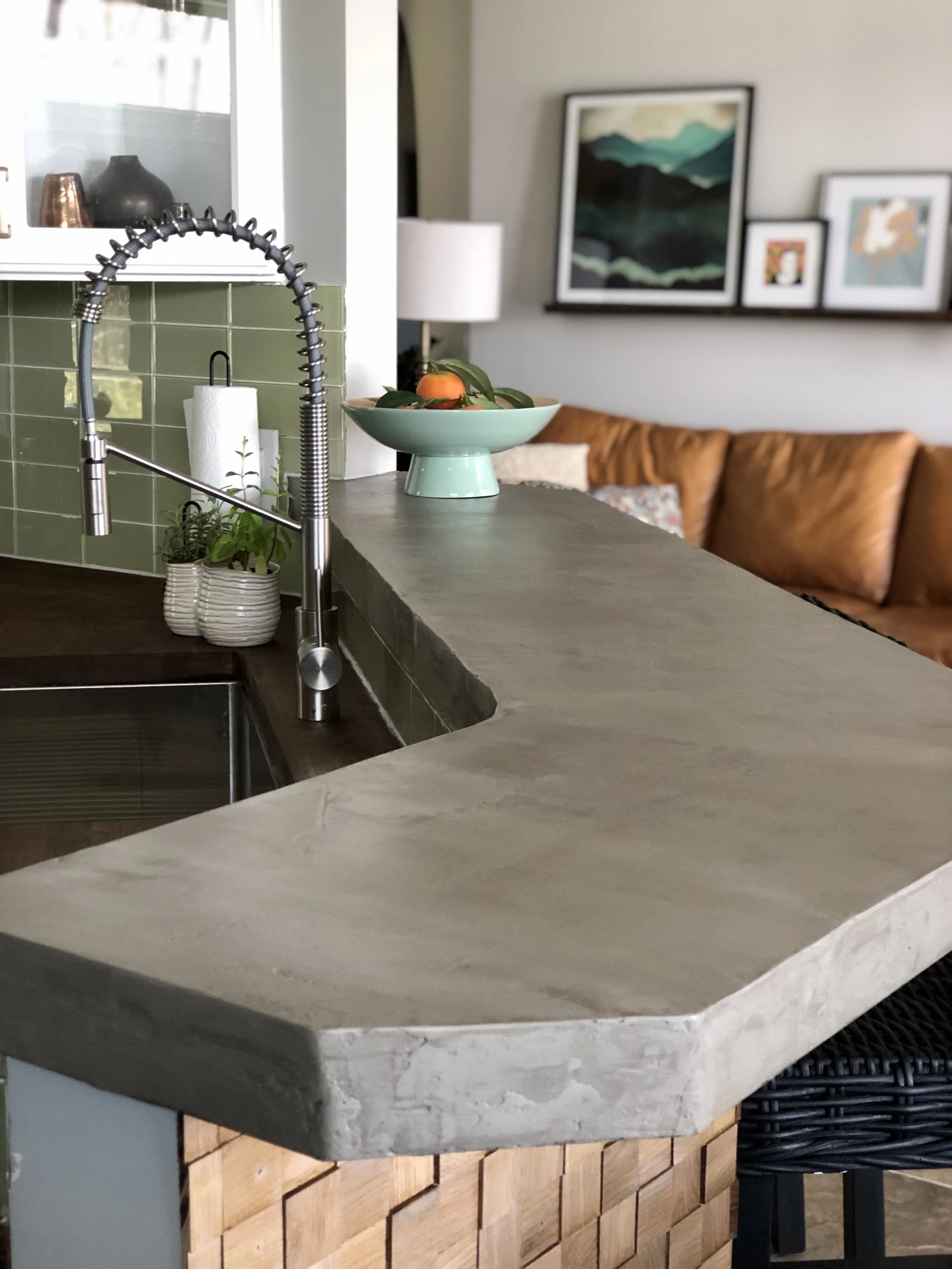Finishing a concrete countertop is a rewarding and customizable process that can enhance the aesthetic appeal and durability of your kitchen or bathroom. Whether you’re a seasoned DIY enthusiast or a first-time concrete artisan, understanding the steps involved and best practices can ensure a successful project. Let’s delve into the comprehensive guide on how to finish a concrete countertop:
Preparation is Key: Before starting the finishing process, ensure that your concrete countertop is properly cured and free of any debris, stains, or imperfections. Thoroughly clean the surface and repair any cracks or chips using a suitable concrete patching compound.
Choose Your Finish: Concrete countertops offer a range of finishing options, including polished, stained, sealed, or textured finishes. Consider the desired look and functionality of your countertop when selecting the finish.
Grinding and Polishing: For a polished finish, begin by grinding the surface with diamond abrasive pads of progressively finer grits to achieve the desired smoothness and shine. This process removes any imperfections and reveals the aggregate within the concrete.
Staining and Coloring: To add color and depth to your concrete countertop, consider staining or coloring the surface. Acid stains penetrate the concrete to create unique, variegated tones, while water-based stains offer a wider range of color options.
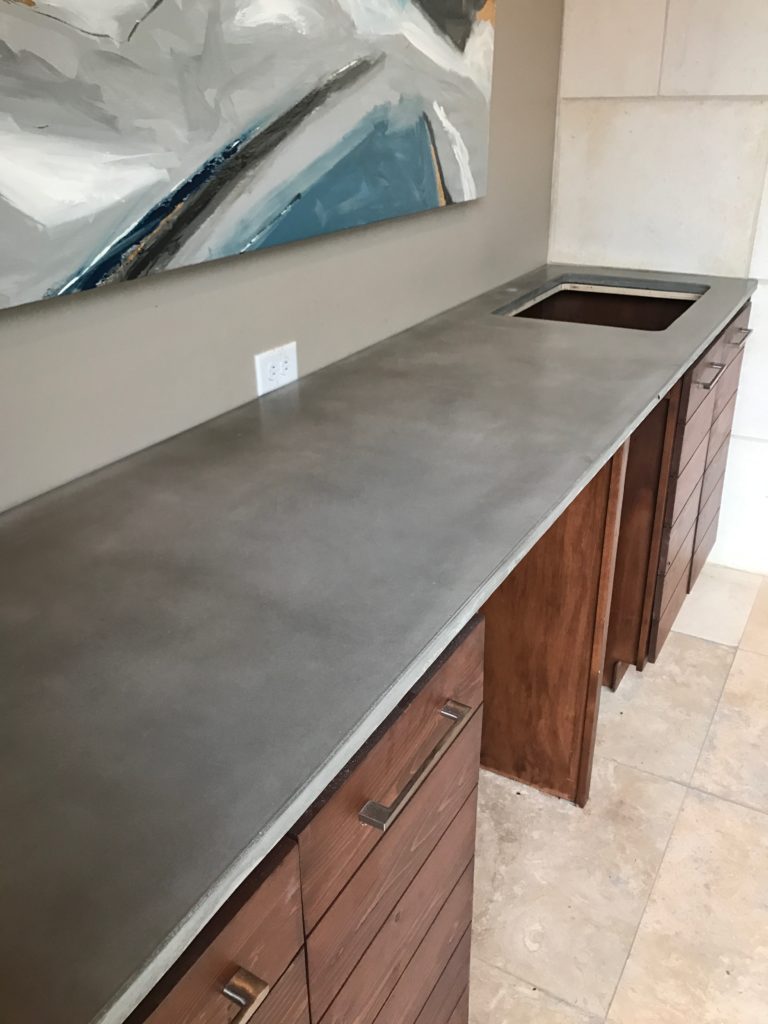
Sealing the Surface: Sealing your concrete countertop is essential for protecting it from stains, moisture, and daily wear and tear. Choose a high-quality concrete sealer suitable for countertops and apply multiple coats for optimal durability.
Applying a Finish Coat: Depending on your desired finish, you may choose to apply a finish coat to enhance the appearance and durability of the countertop. Options include epoxy coatings, polyurethanes, or food-safe sealants designed specifically for countertops.
Adding Texture: If you prefer a textured finish, consider using techniques such as troweling, stamping, or embedding decorative elements into the concrete before it cures. This adds visual interest and tactile appeal to your countertop.

Curing and Drying: Allow sufficient time for the finish to cure and dry completely before using the countertop. Follow the manufacturer’s instructions for curing times and conditions to ensure optimal results.
Maintenance Tips: Proper maintenance is key to preserving the beauty and longevity of your concrete countertop. Clean spills promptly, avoid using abrasive cleaners, and periodically reseal the surface to maintain its protective properties.
Customization Options: Concrete countertops offer endless customization possibilities, allowing you to incorporate unique colors, textures, and decorative elements to suit your personal style and design preferences.
Cost Considerations: While concrete countertops can be a cost-effective option compared to natural stone or solid surface materials, the overall cost will vary depending on factors such as size, complexity of design, and chosen finishes.
DIY vs. Professional Installation: Deciding whether to tackle the project yourself or hire a professional depends on your level of experience, time constraints, and budget. While DIY can be rewarding, professional installers have the expertise and tools to ensure a flawless finish.

Environmental Impact: Concrete countertops are considered environmentally friendly due to their durability and potential for incorporating recycled materials. Additionally, choosing water-based stains and sealers minimizes harmful emissions.
Long-Term Durability: When properly installed and maintained, concrete countertops can last for decades, making them a durable and sustainable choice for your home.
Versatility in Design: Concrete countertops offer unparalleled versatility in design, allowing you to create custom shapes, edge profiles, and surface finishes to complement any kitchen or bathroom aesthetic.

How long does it take to finish a concrete countertop?
The time required to finish a concrete countertop depends on factors such as size, complexity of design, chosen finishes, and curing times. Typically, the process can take anywhere from several days to a week or more.
Can I repair a damaged concrete countertop?
Yes, damaged concrete countertops can be repaired using appropriate patching compounds and techniques. It’s essential to address any cracks or chips promptly to prevent further damage and maintain the integrity of the countertop.
Are concrete countertops prone to staining?
Concrete countertops can be prone to staining if not properly sealed. Applying a high-quality concrete sealer and promptly cleaning up spills can help prevent staining and prolong the lifespan of the countertop.
How do I maintain a concrete countertop?
To maintain a concrete countertop, clean spills promptly with a mild soap and water solution, avoid using abrasive cleaners or scrubbers, and periodically reseal the surface according to the manufacturer’s recommendations.
Can I customize the color and design of my concrete countertop?
Yes, concrete countertops offer endless customization options, including choosing colors, textures, and decorative elements to suit your personal style and design preferences. Discuss your ideas with a professional installer or concrete artisan to bring your vision to life.
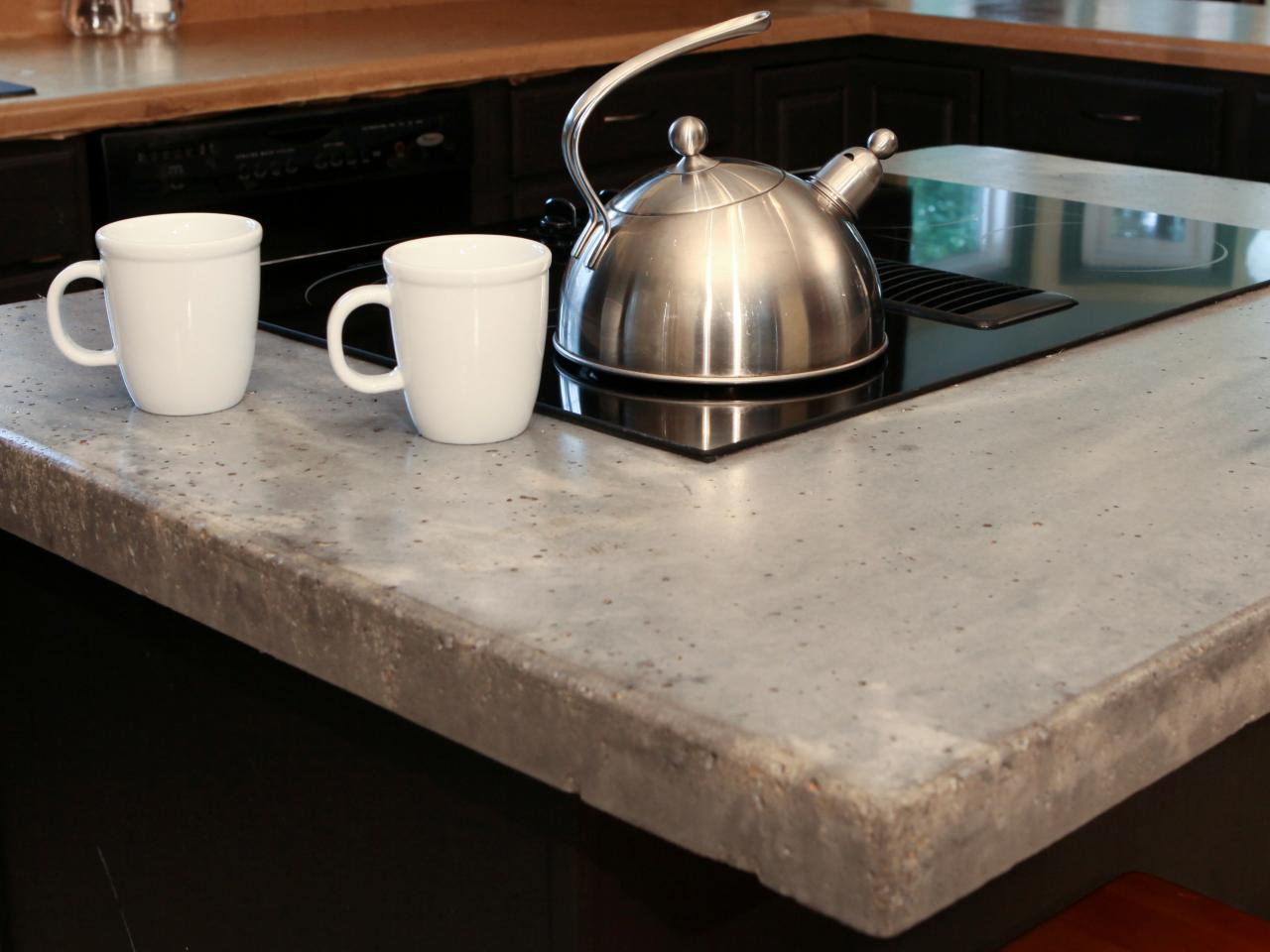
DIY Concrete Over Laminate Countertops Using Feather Finish

How to DIY a Concrete Bar Top – In a weekend! – A Life Unfolding
DIY Feather Finish Concrete Countertops – {And How They Failed Us}
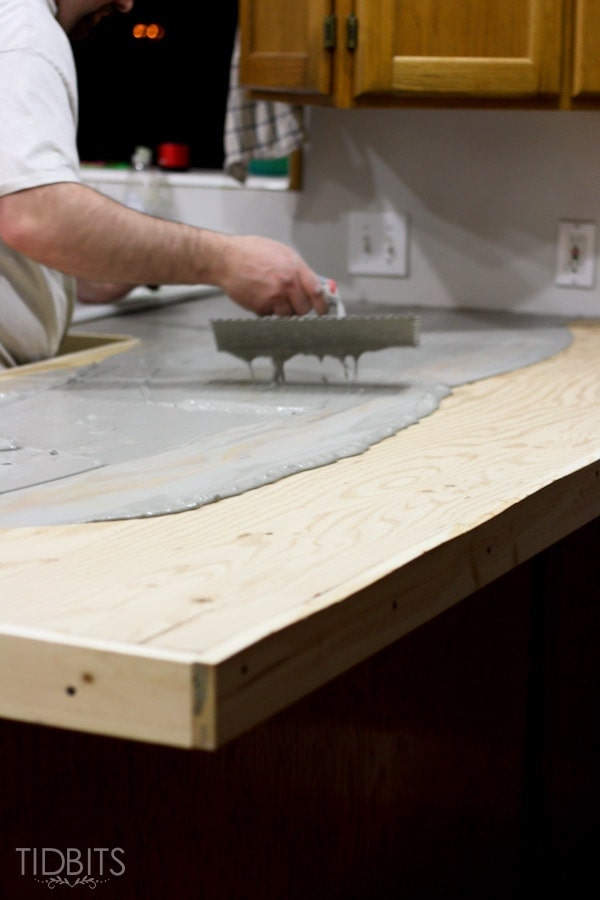
Spreading Ardex Feather Finish on Our Kitchen Counters

Concrete Countertop DIY – A Beautiful Mess
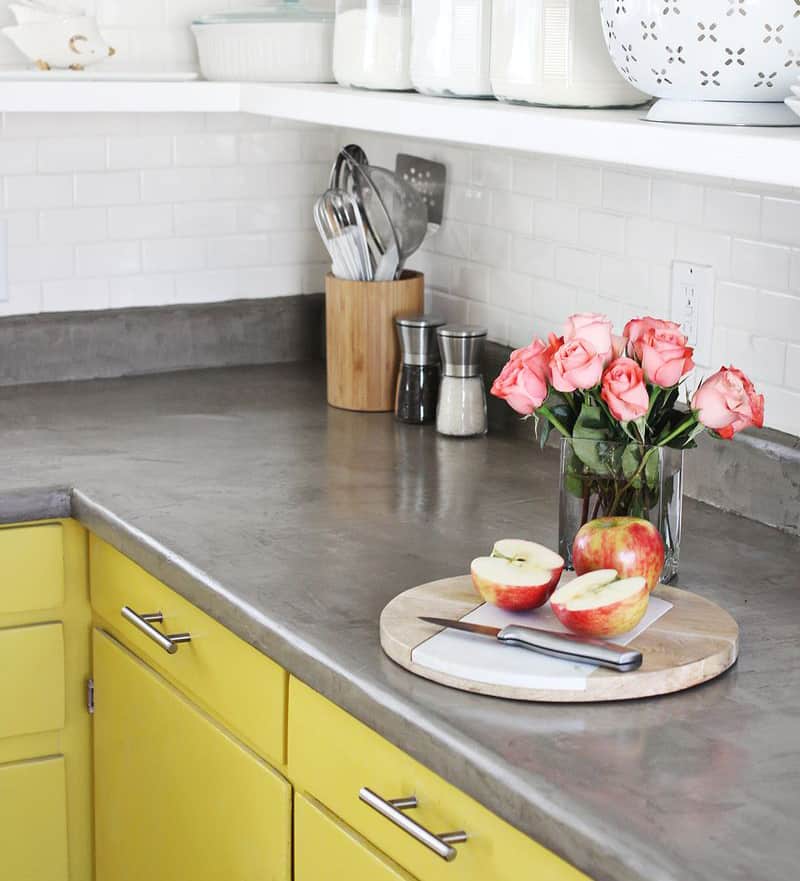
Related articles:
- Outdoor Concrete Countertops
- How To Make Concrete Countertops Smooth
- Rustic Concrete Countertops
- Farmhouse Concrete Countertops
- Concrete Countertops Outdoor Kitchen
- How To Stain Concrete Countertops
- DIY Concrete Countertop Mix
- Concrete Countertops Made Easy
- Concrete Countertop Overlay
- Black Concrete Countertops
How To Finish A Concrete Countertop
Creating a concrete countertop can be a great way to add a unique, custom look to any kitchen. Concrete countertops are durable, low-maintenance, and cost-effective. Finishing your concrete countertop correctly is essential in ensuring it will last for years to come. Here, we will provide you with step-by-step instructions on how to finish a concrete countertop.
Features of a Concrete Countertop
Concrete countertops offer many desirable features that make them a popular choice for homeowners. They are:
• Durable – Concrete is incredibly hard and resilient, making it an incredibly hardy material for a countertop.
• Low Maintenance – Because concrete is so strong and resilient, it requires minimal care and maintenance.
• Cost Effective – When compared to natural stone or engineered quartz, concrete is a much more cost-effective option.
• Customized Look – With concrete, you can customize the shape, color, and texture of your countertop to suit your unique style.
Benefits of Finishing A Concrete Countertop
Finishing your concrete countertop is essential in ensuring it looks its best and lasts for years to come. The benefits of finishing your concrete countertop include:
• Increased Durability – Finishing your concrete countertop will help protect it from water damage and stains.
• Enhanced Appearance – Finishing your concrete countertop will give it a smooth, glossy finish that will make it stand out in any room.
• Improved Sealant Protection – Finishing your concrete countertop will help ensure that the sealant applied to it will last longer.
Step-By-Step Guide To Finishing A Concrete Countertop
Finishing your concrete countertop is simple and straightforward if done correctly. Here are the steps you need to take:
1. Clean the Surface – Before you begin, make sure the surface of the countertop is clean and free of any debris or dirt. Use a mild detergent and warm water to wash the surface thoroughly.
2. Apply Primer – Once the surface is clean, you can apply a primer to help ensure the finish adheres correctly to the surface of the countertop. Make sure to follow the instructions on the primer’s packaging for best results.
3. Apply Sealant – Once the primer has fully dried, you can now apply the sealant to help protect your concrete countertop from water damage and stains. Again, make sure to follow the instructions on the sealant’s packaging for best results.
4. Apply Finish – Finally, you can now apply your chosen finish to the surface of the countertop. Again, make sure to follow the instructions on the finish’s packaging for best results. Allow it to dry completely before use.
Pros and Cons of Finishing A Concrete Countertop
Finishing a concrete countertop comes with both pros and cons that should be taken into consideration before beginning the process:
Pros:
• Increased durability
• Enhanced appearance
• Improved sealant protection
Cons:
• Time consuming process
• Requires specialized tools
• Potentially hazardous chemicals used in finishes
Installation, Care, and Maintenance of Finishing A Concrete Countertop
Installing a finished concrete countertop is relatively straightforward if done correctly. Here are some tips on installation, care, and maintenance:
Installation: Make sure you have all of your tools and materials ready before installation begins. Follow directions closely when cutting and installing your countertops. It’s also important to wear gloves and protective masks when working with potentially hazardous chemicals such as sealants or finishes.
How long does it take to finish a concrete countertop?
The amount of time it takes to finish a concrete countertop depends on several factors such as size, thickness, type of finish used, etc., but on average it should take approximately 2-4 hours from start to finish.
